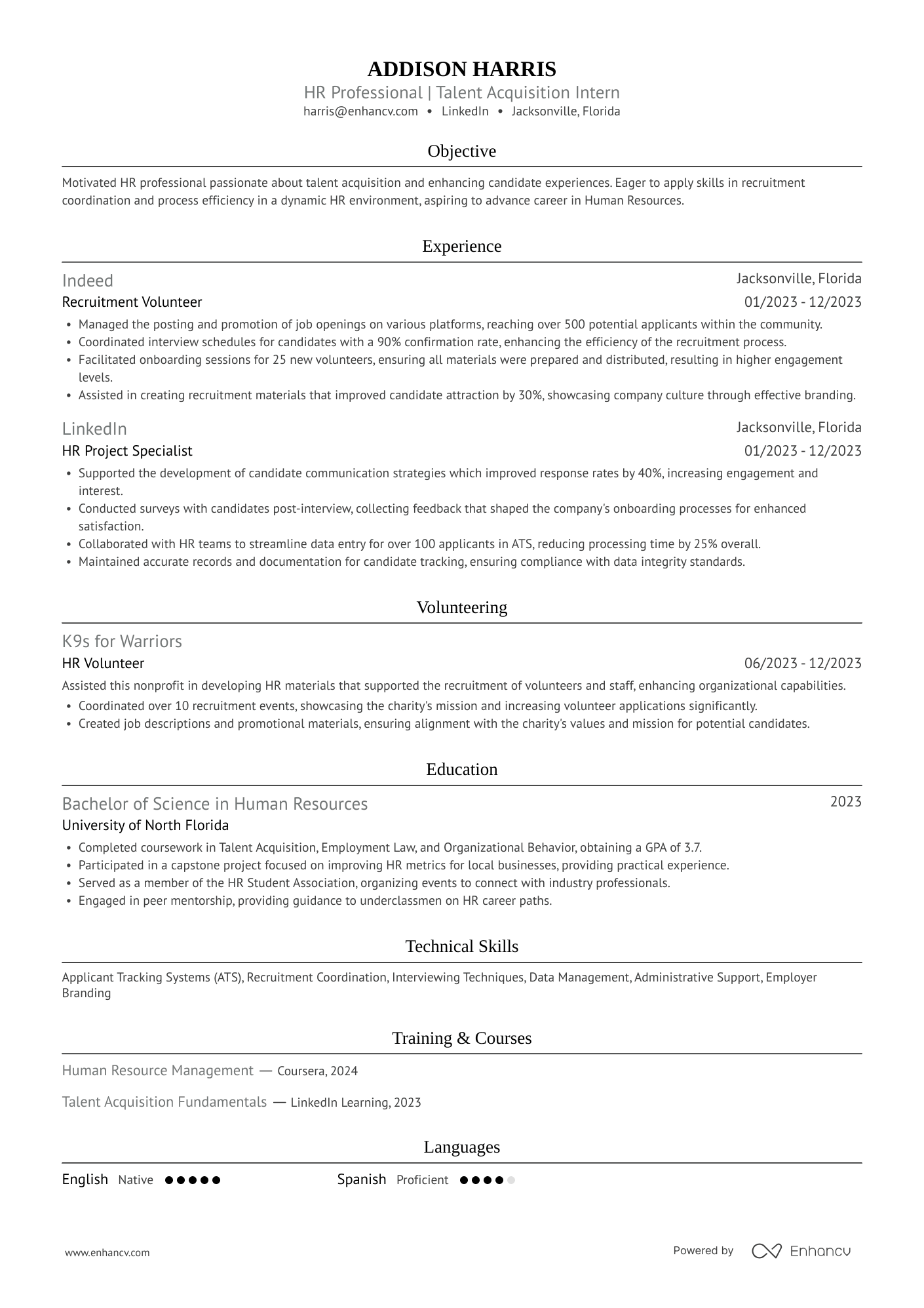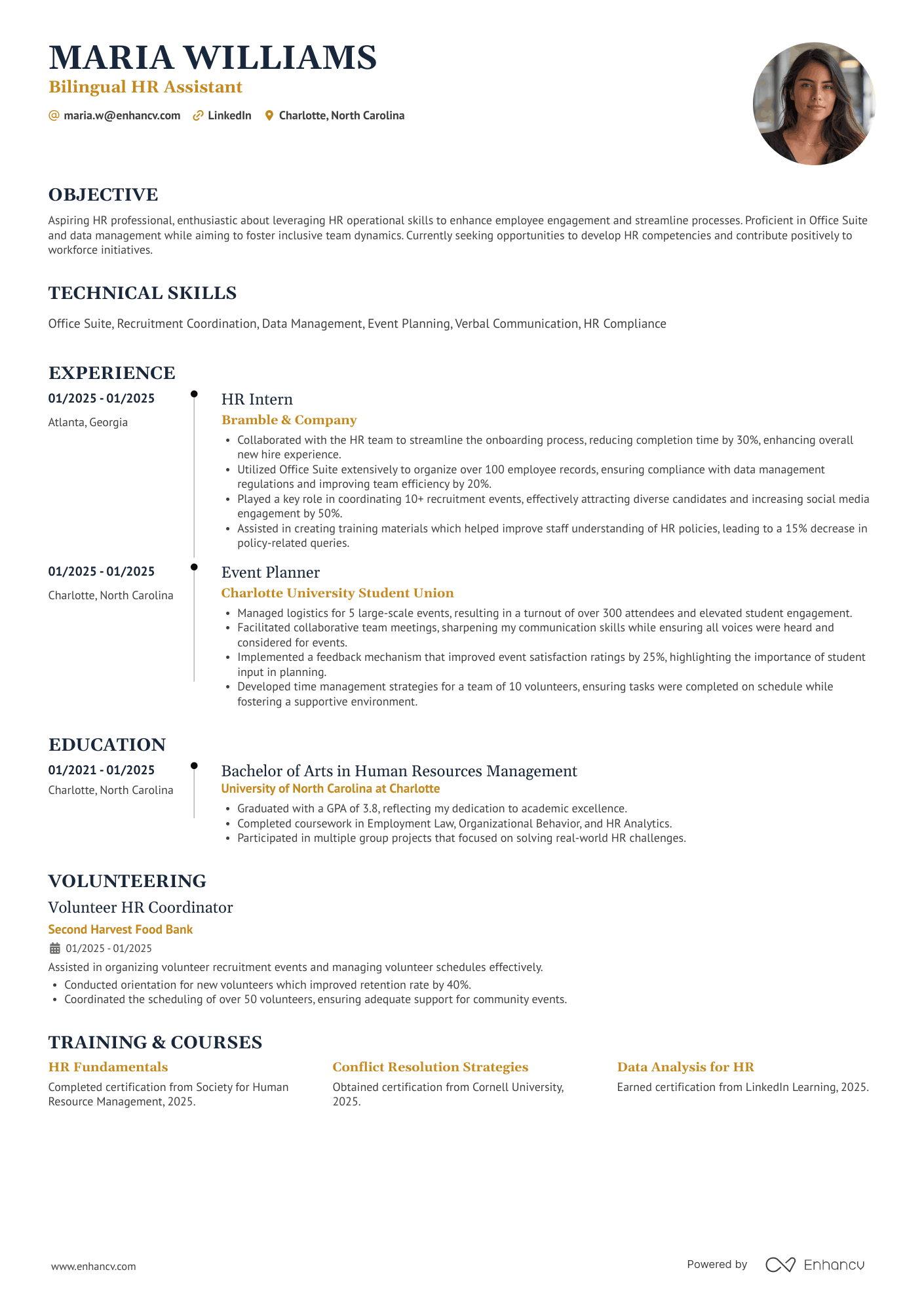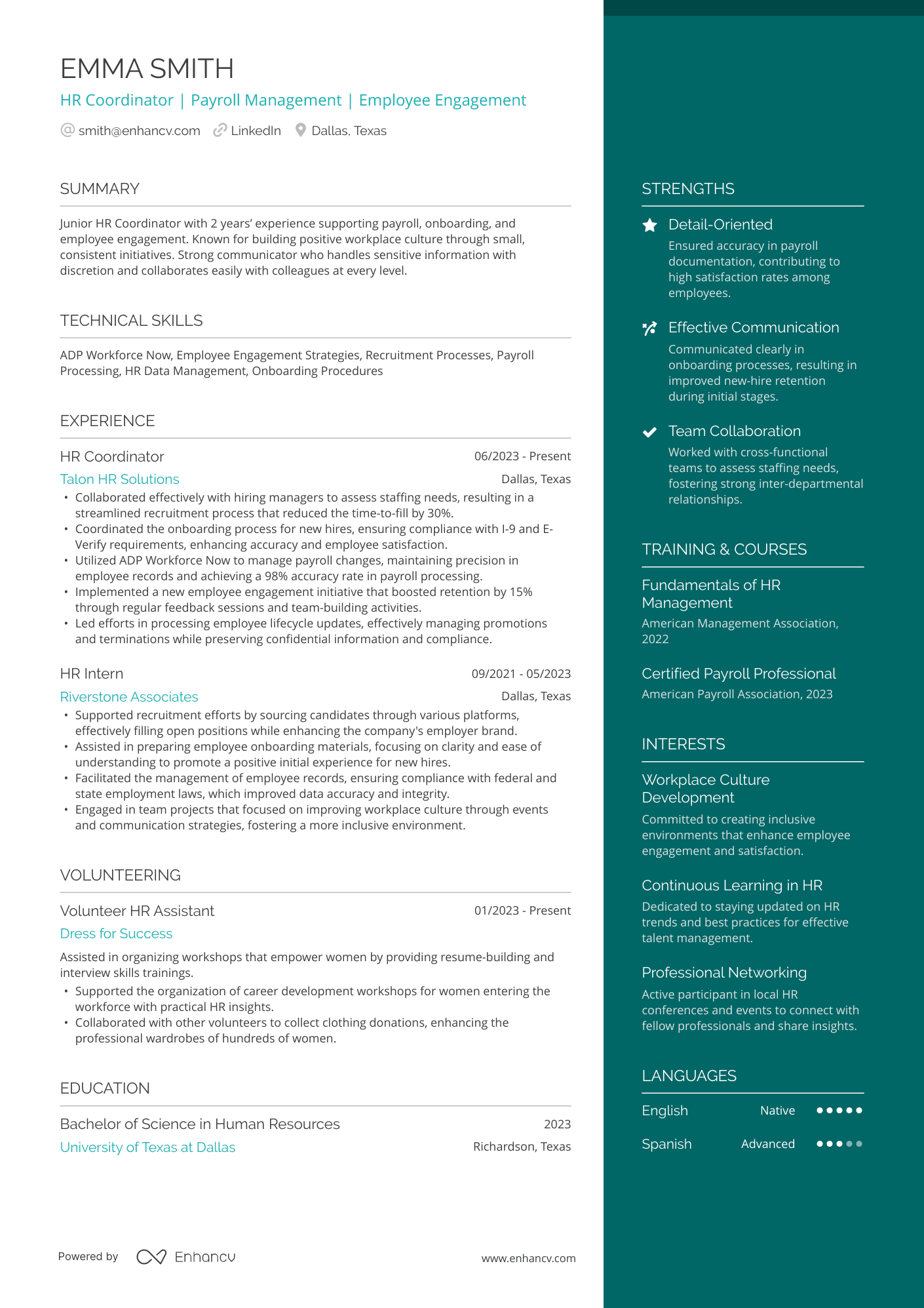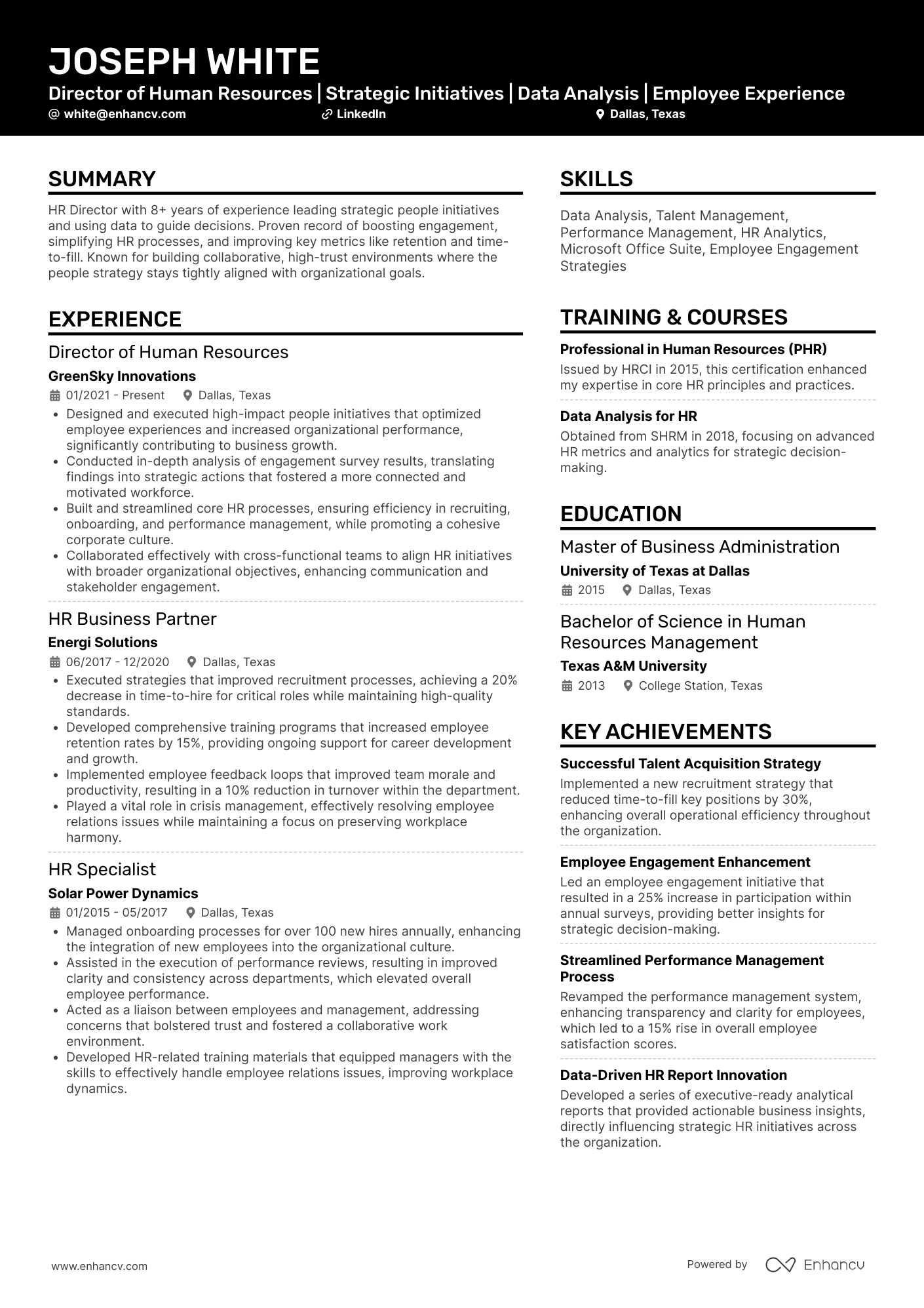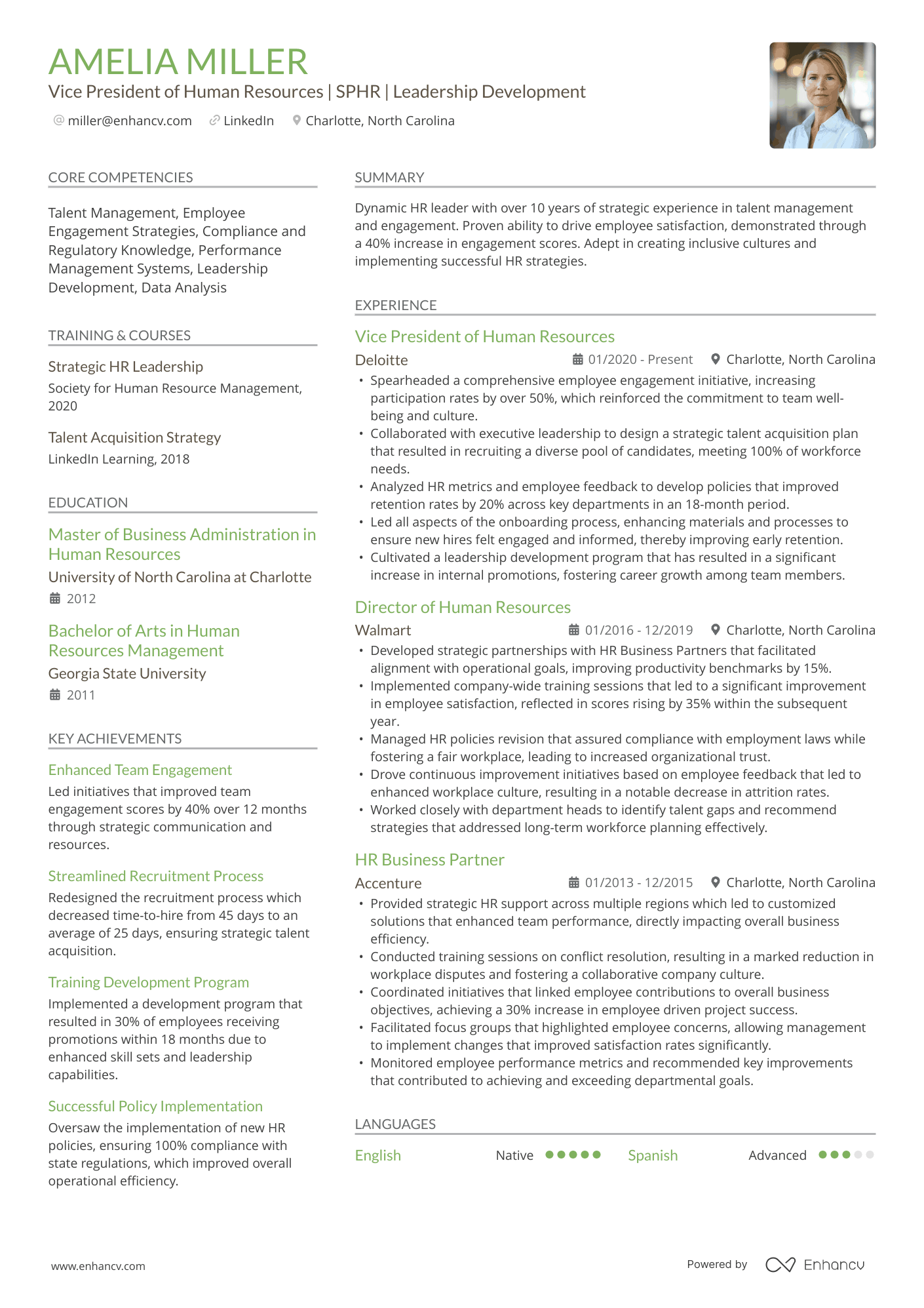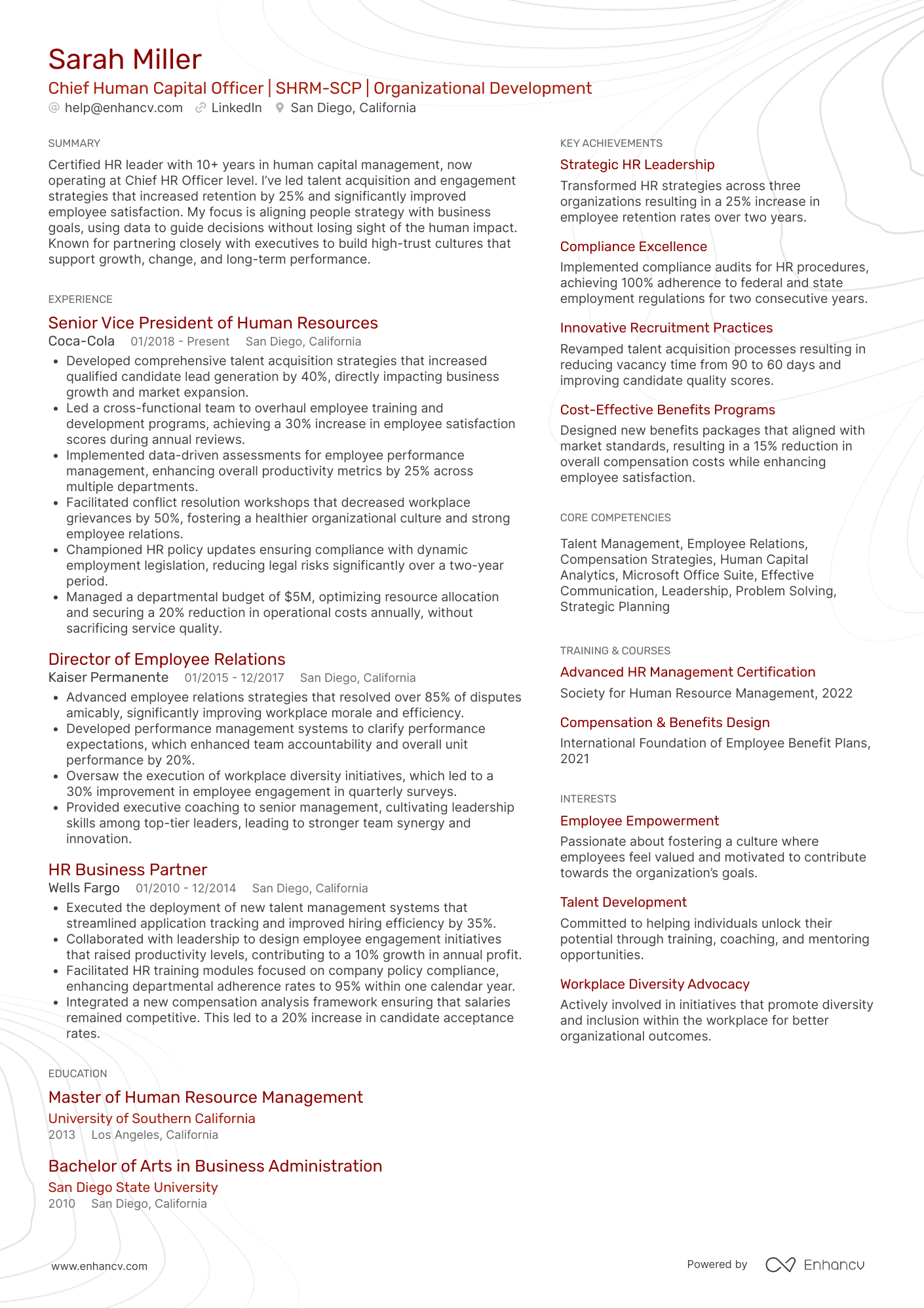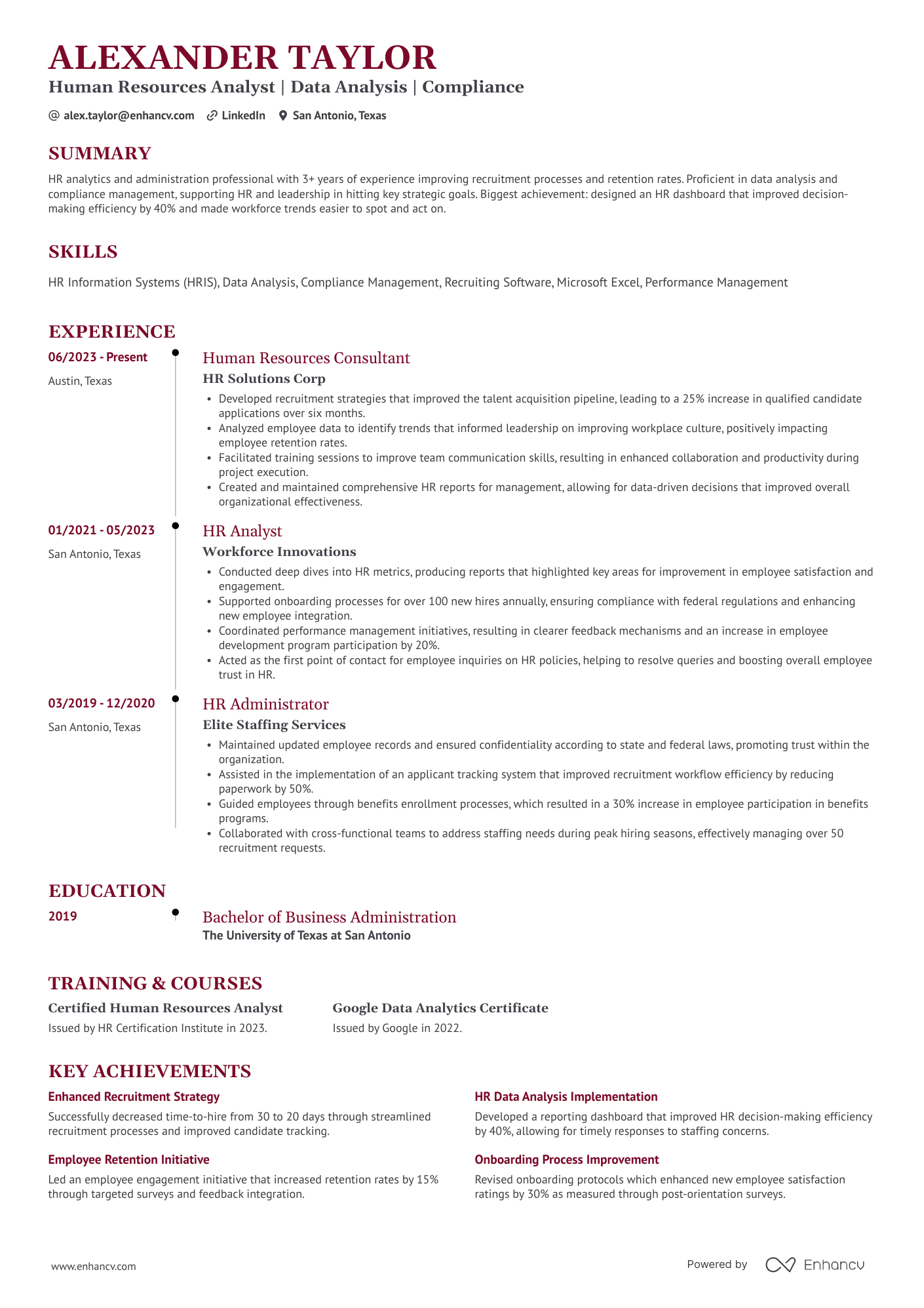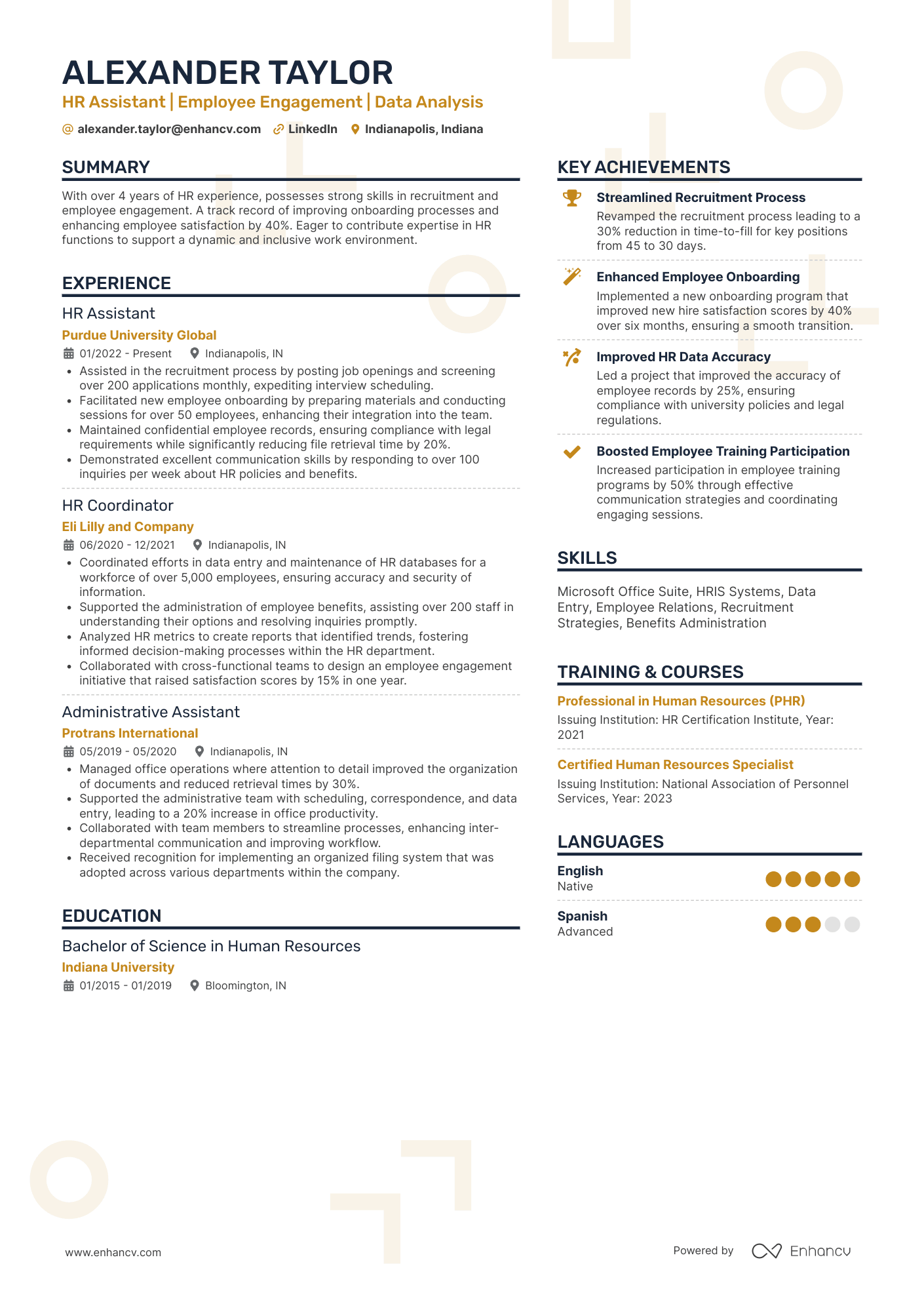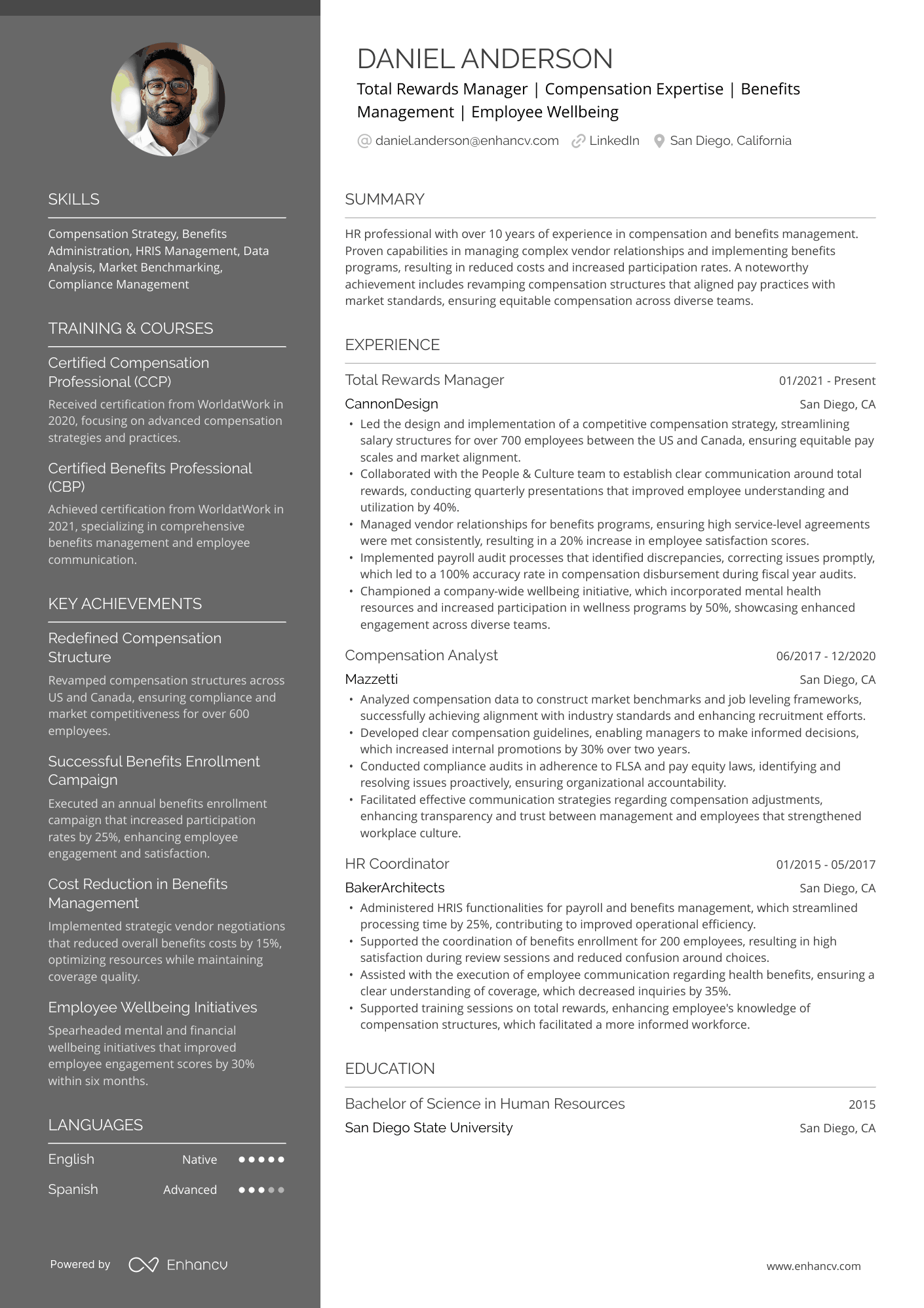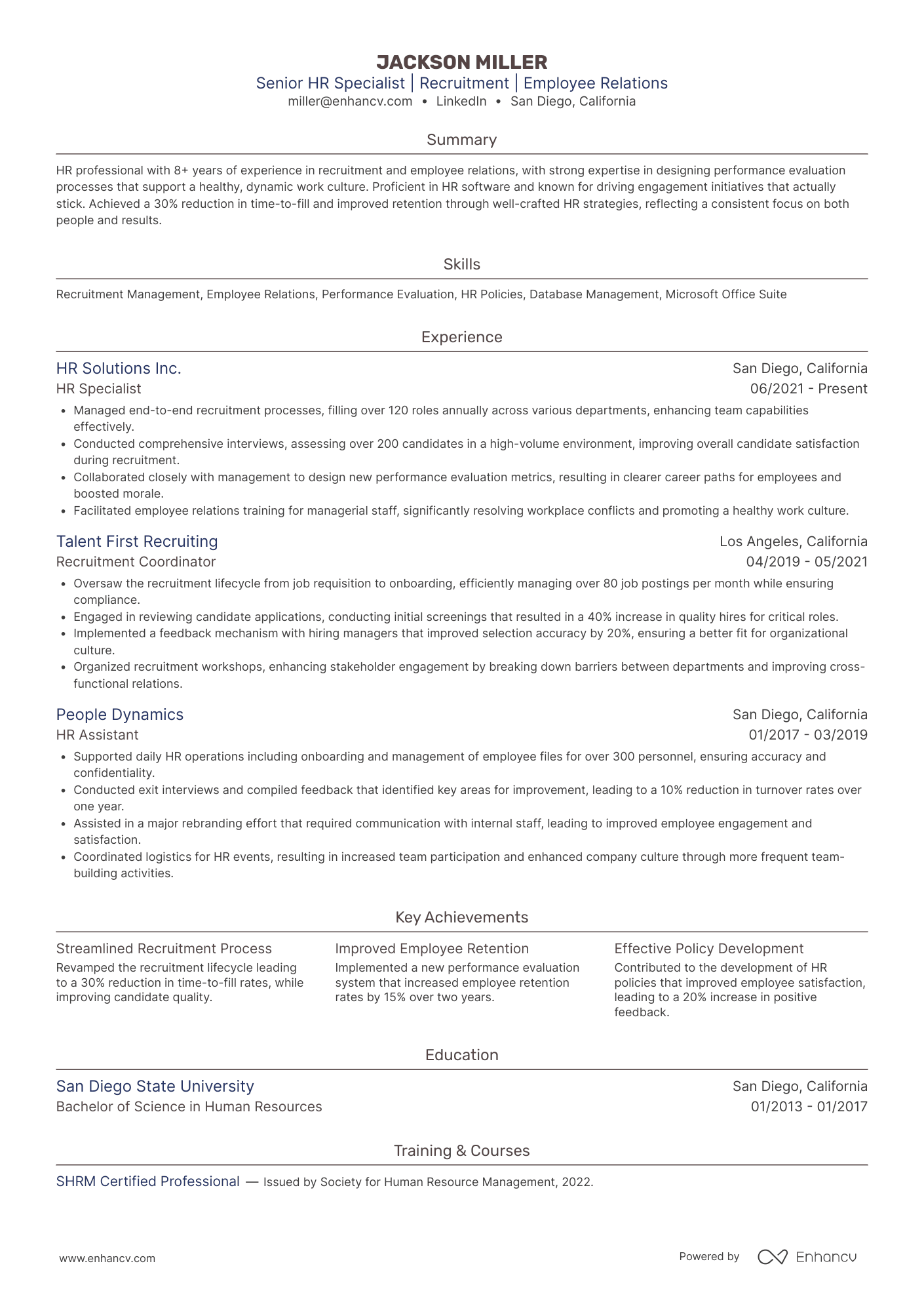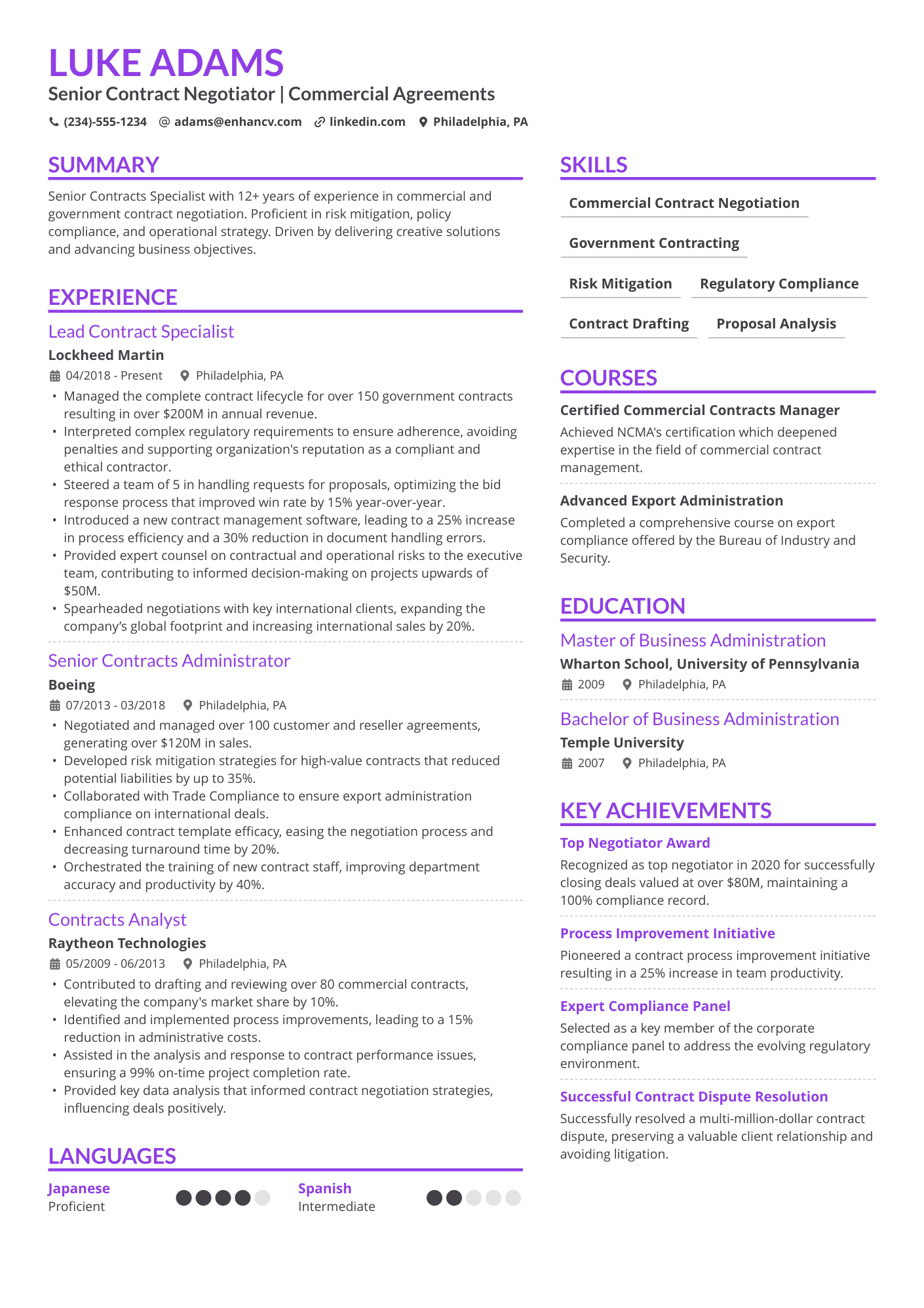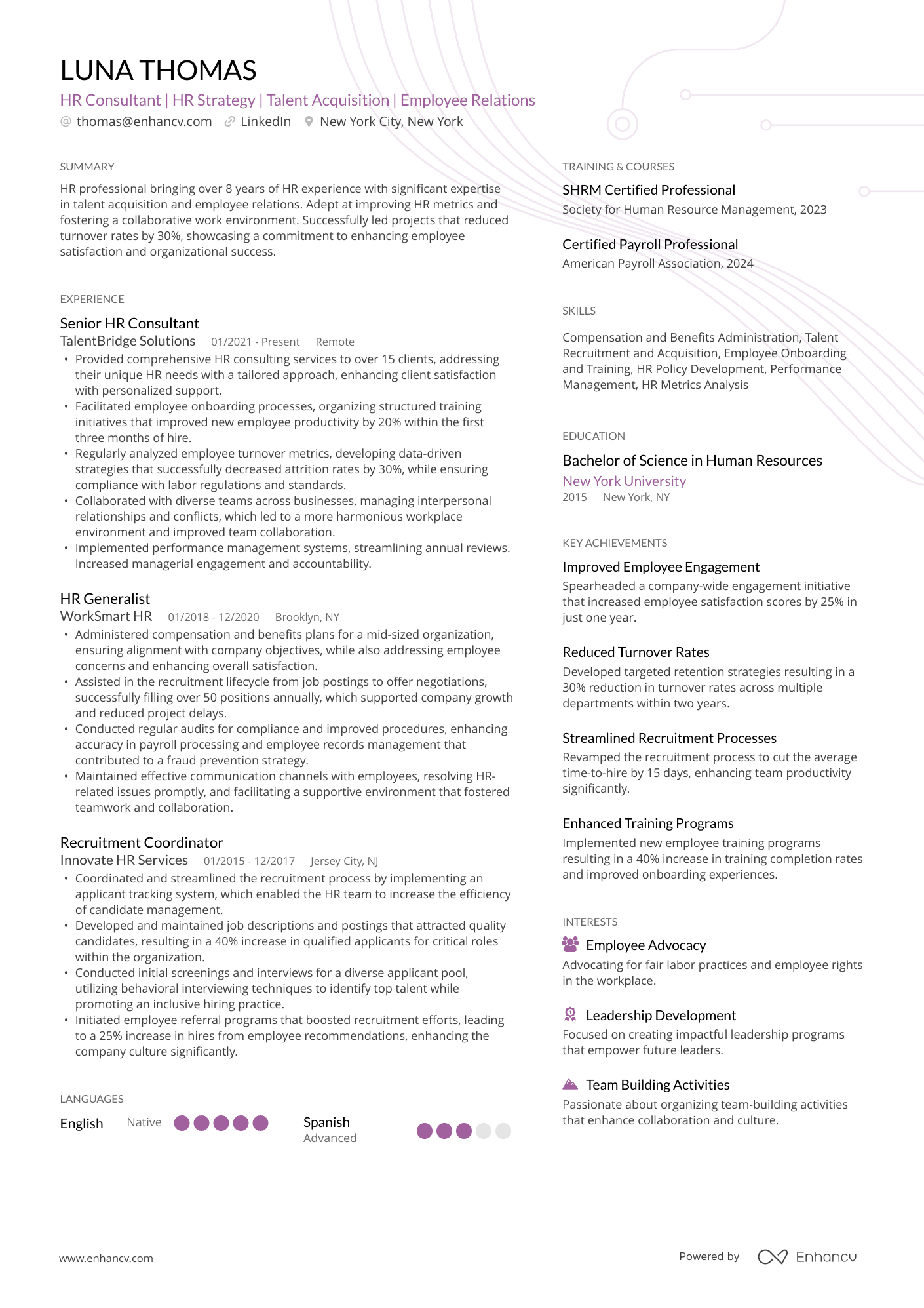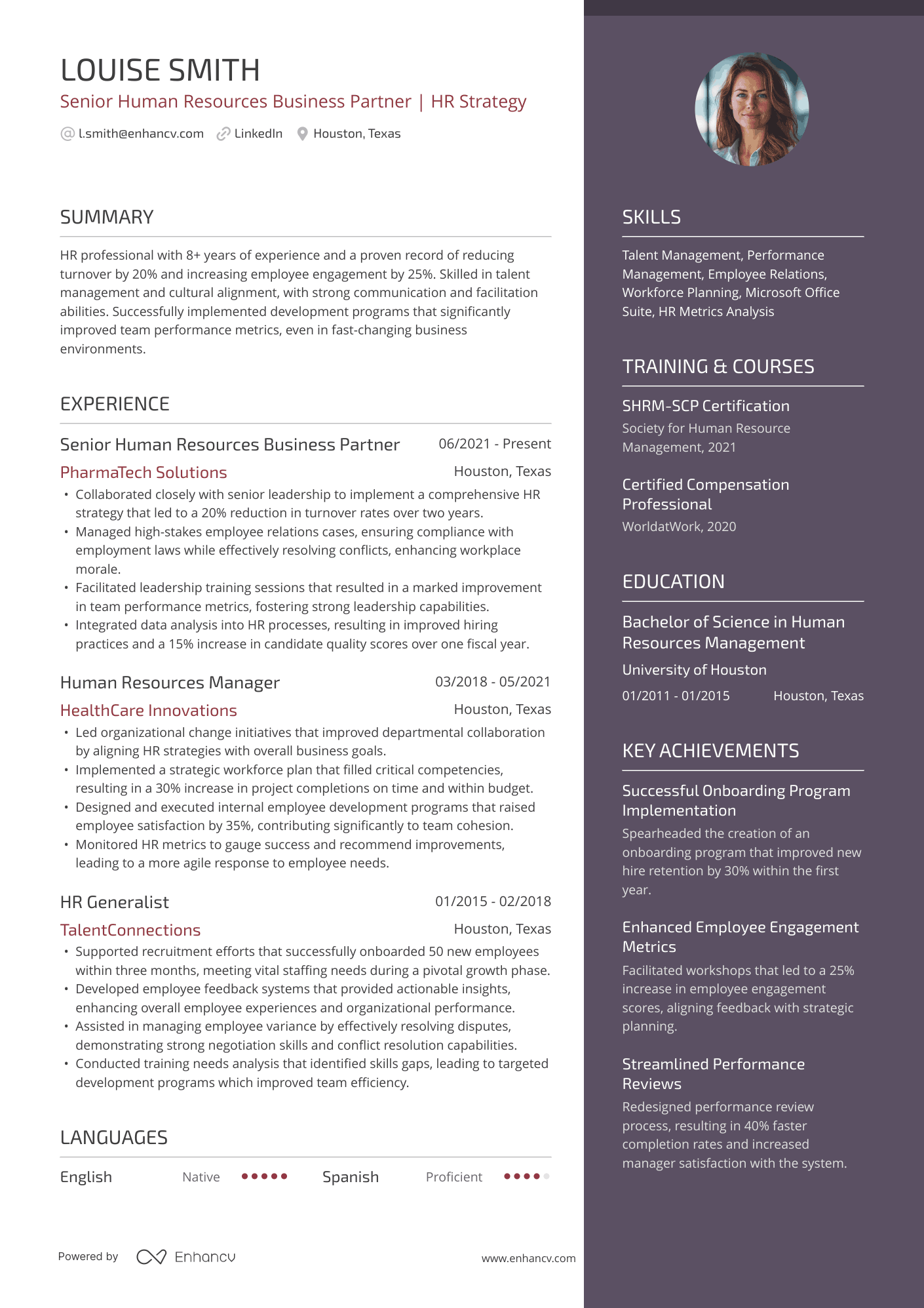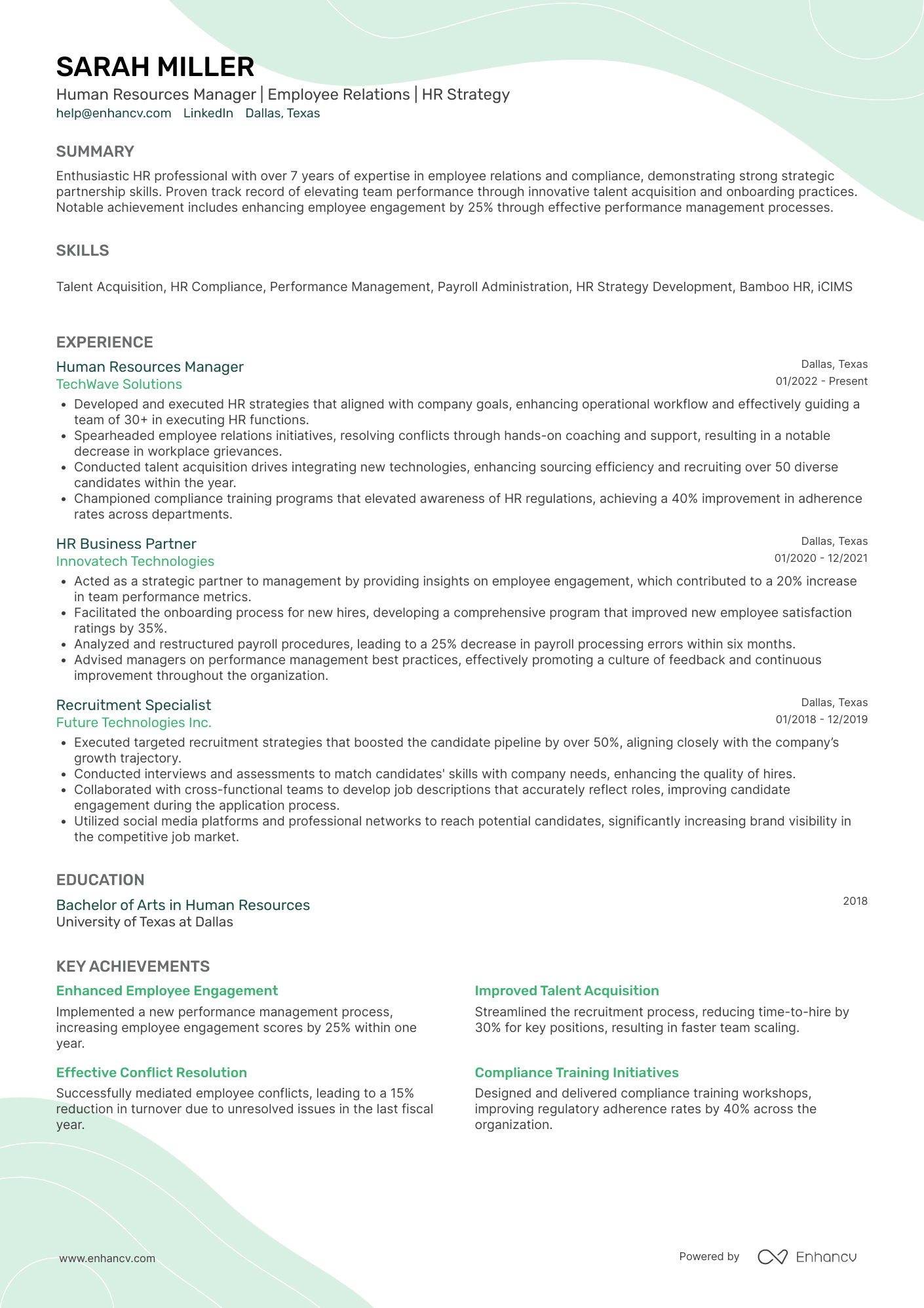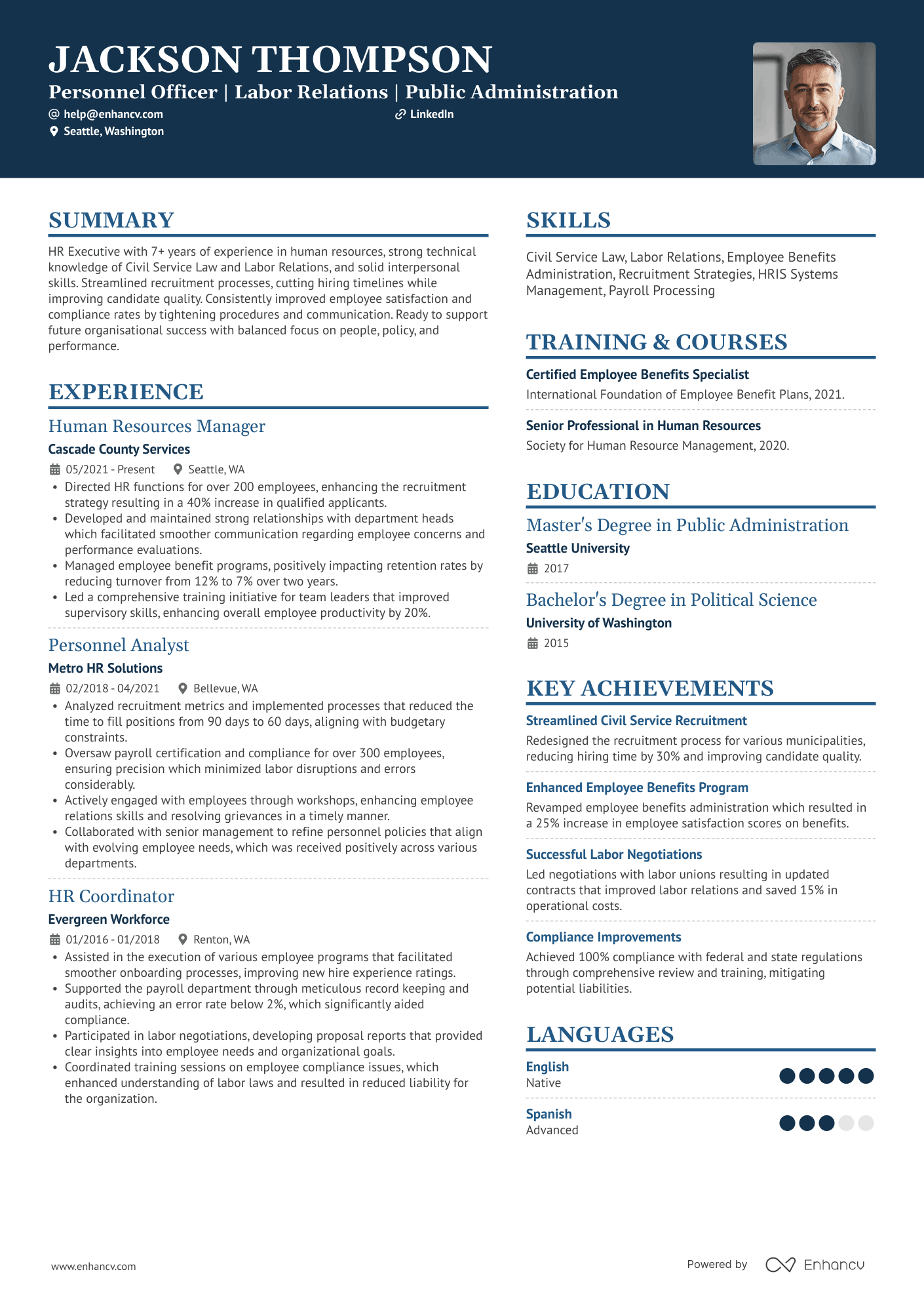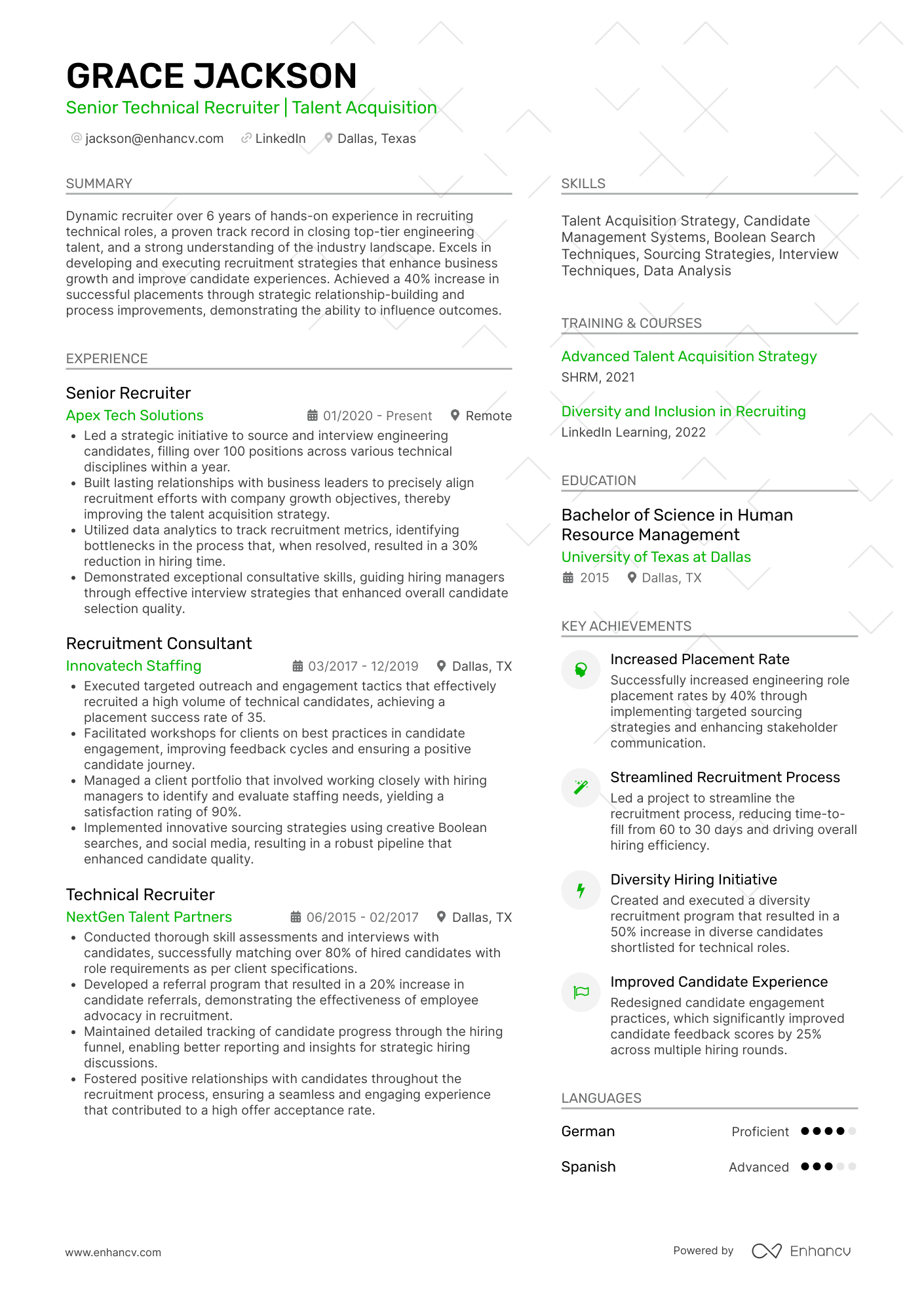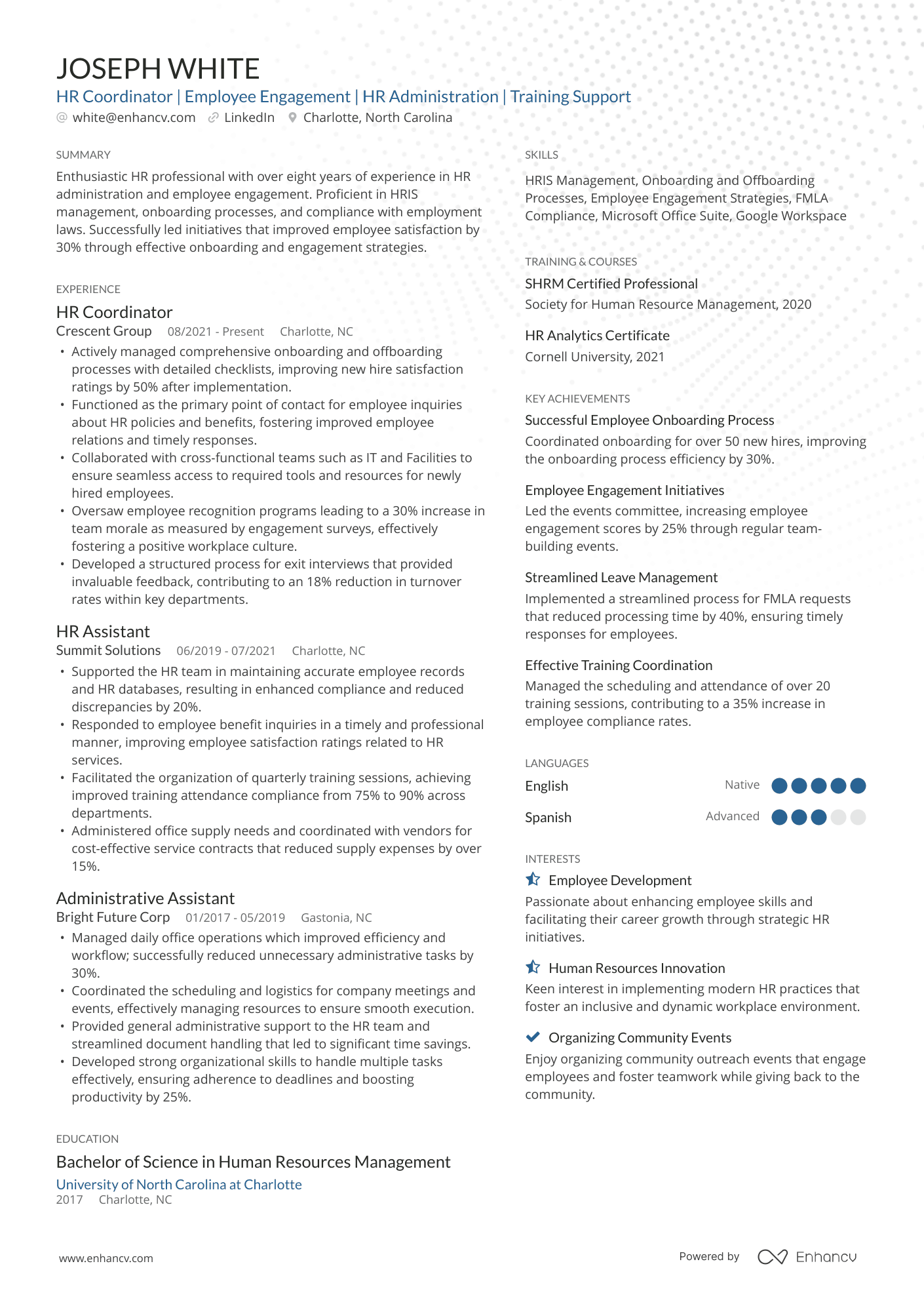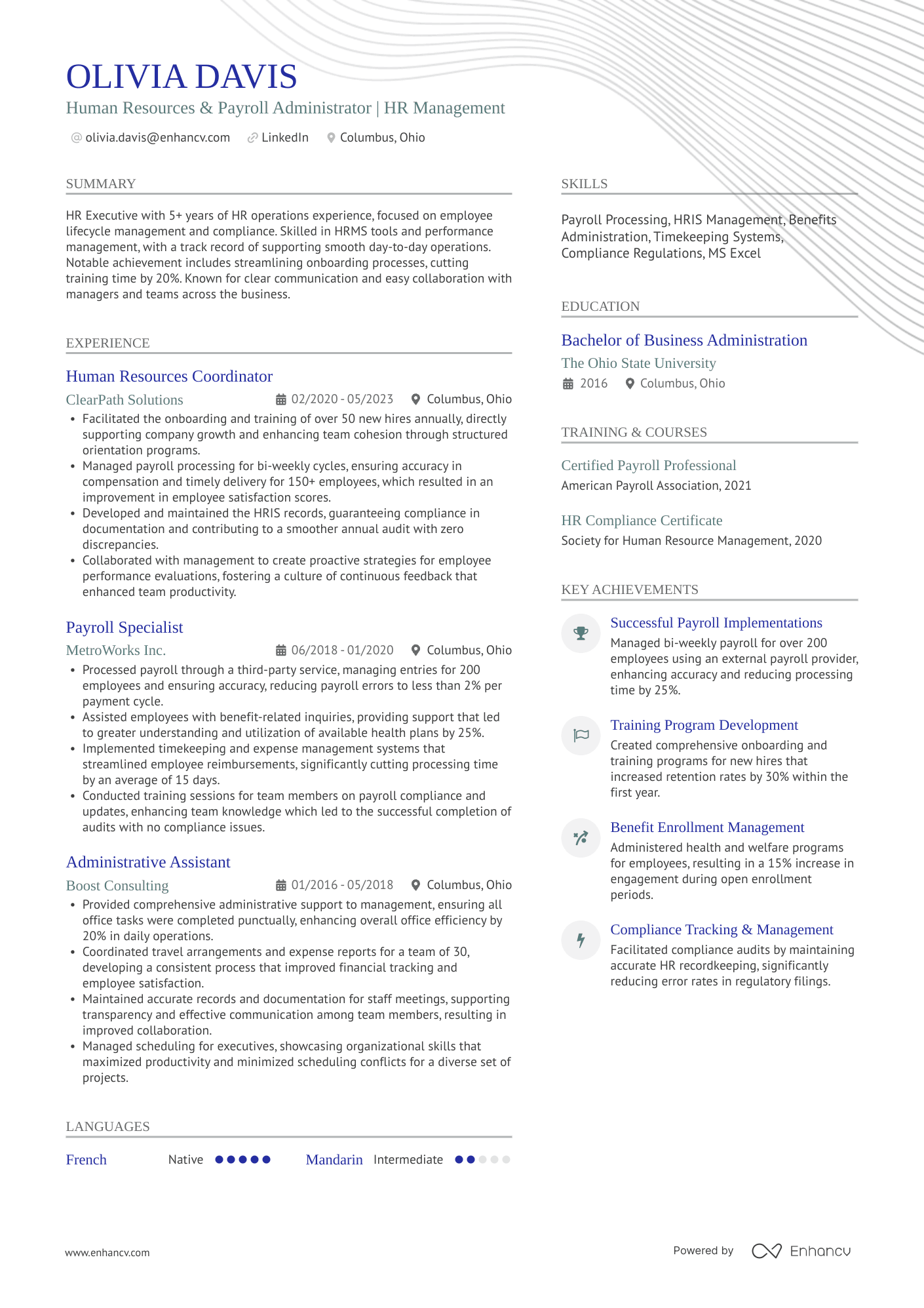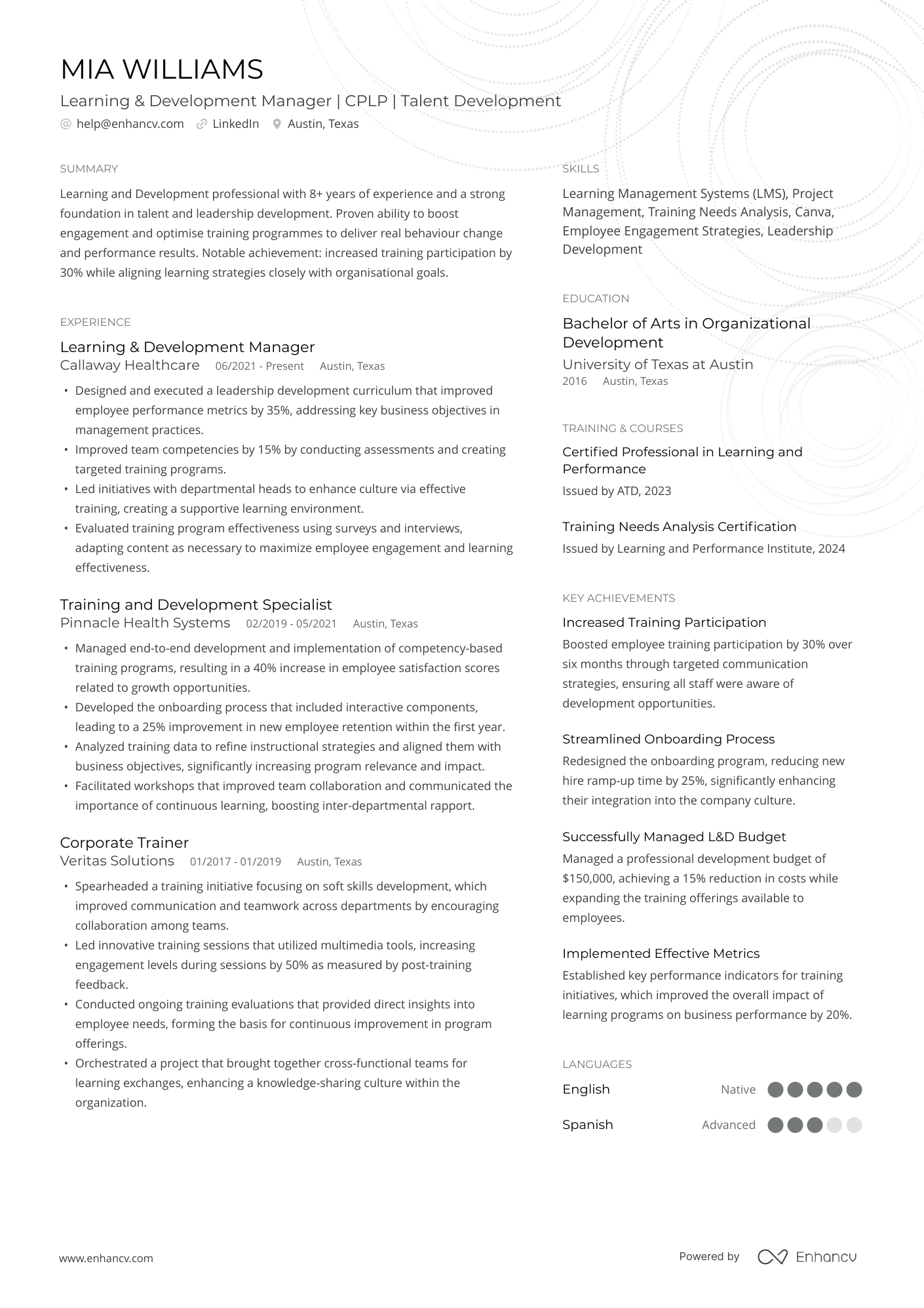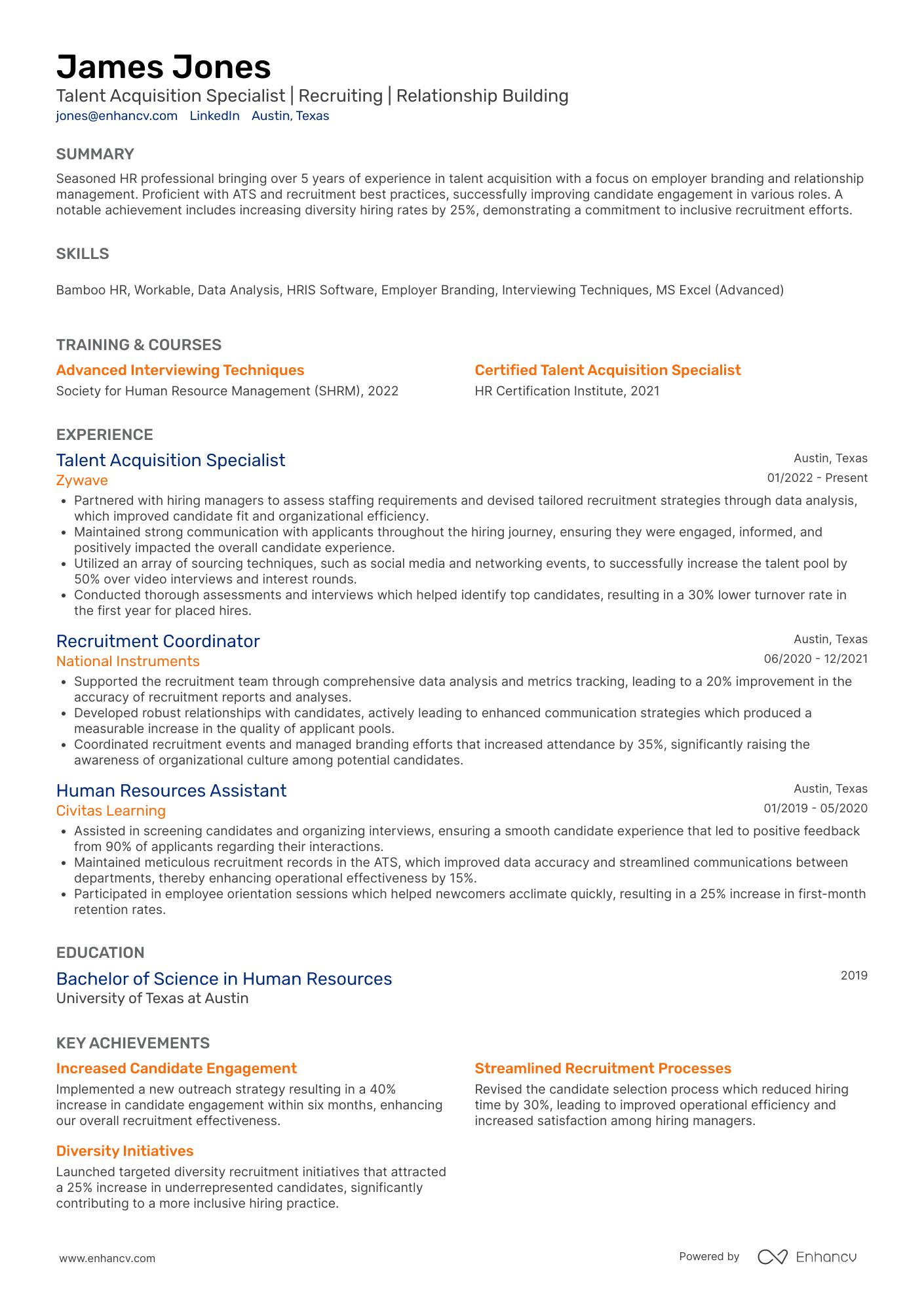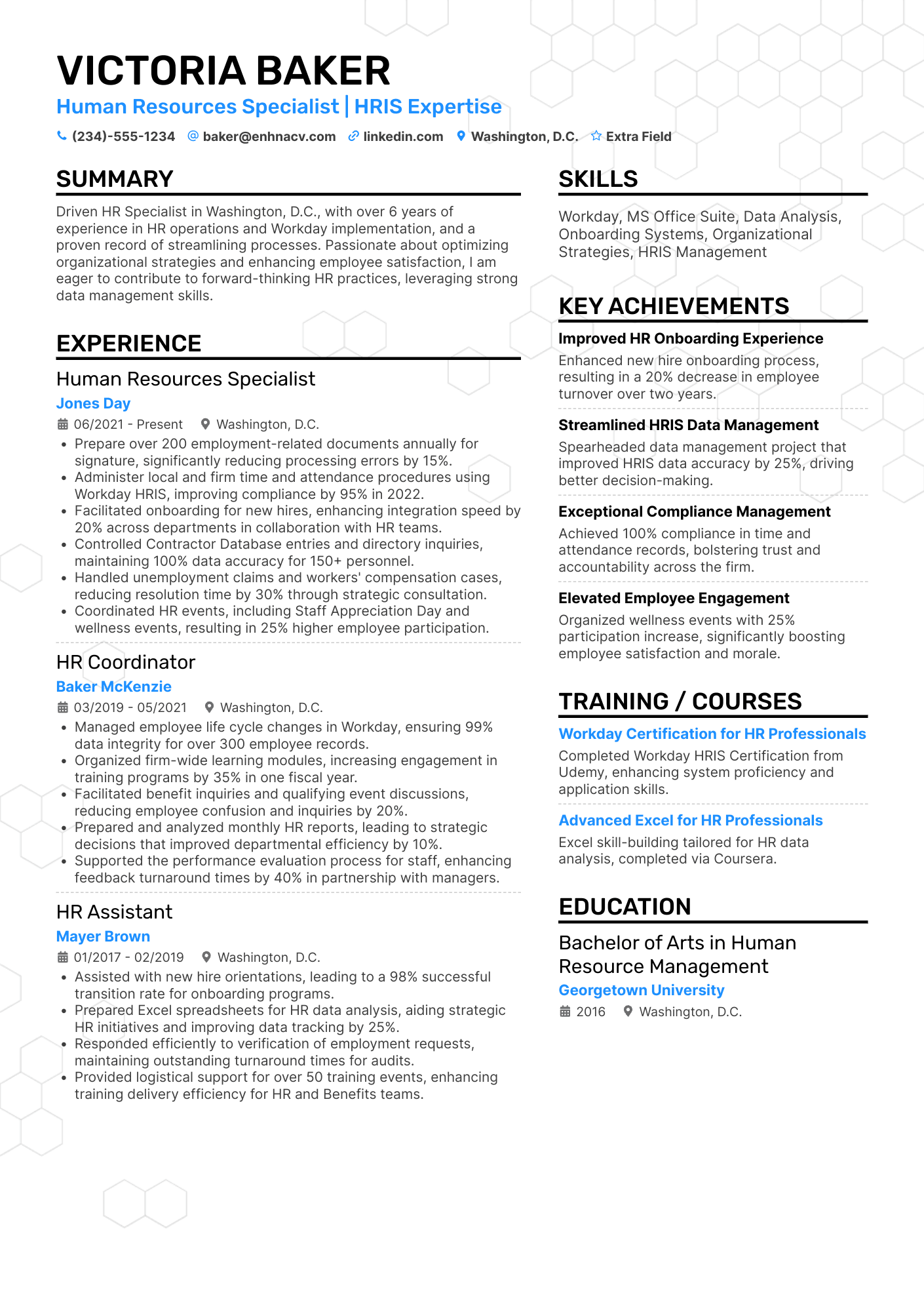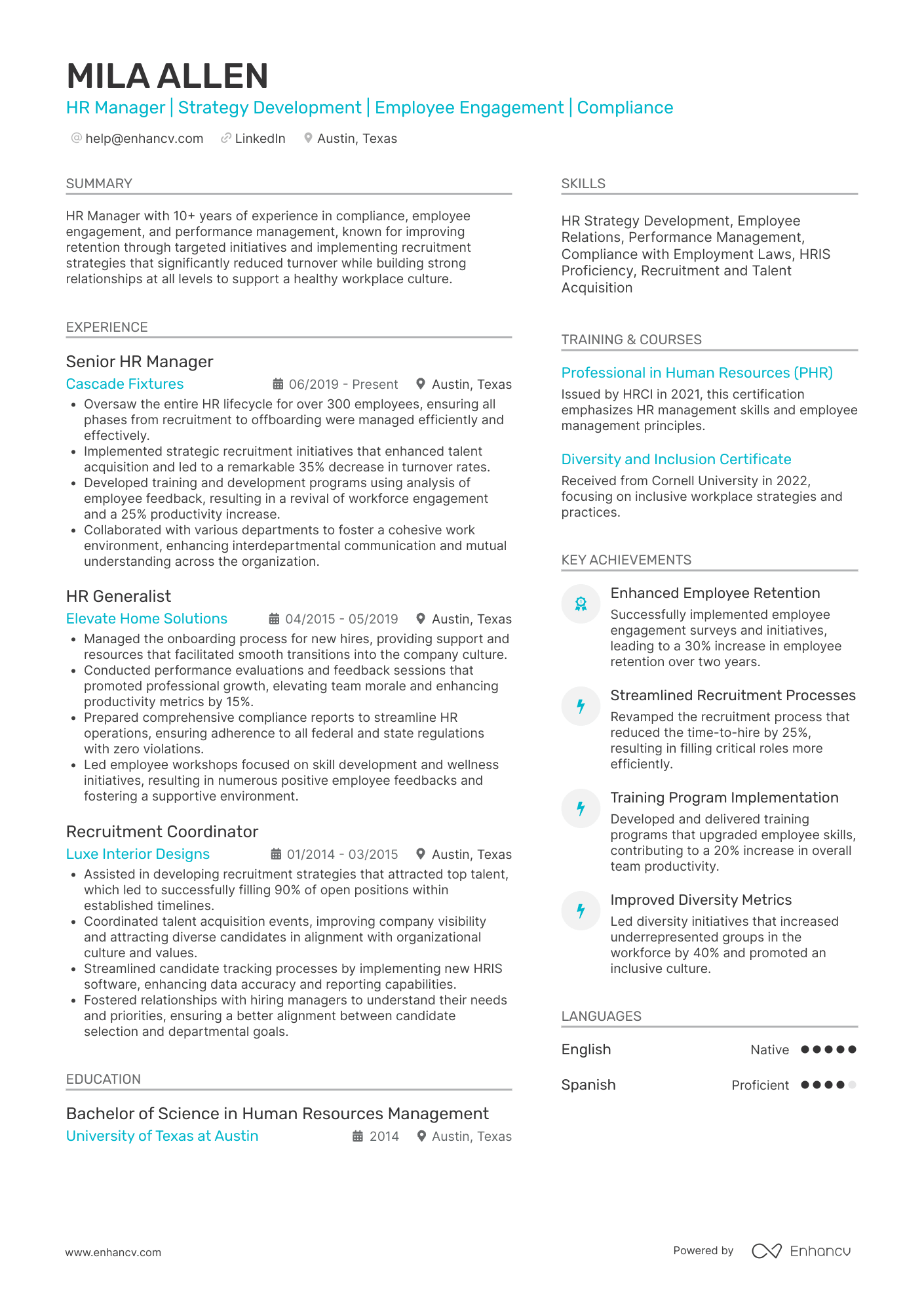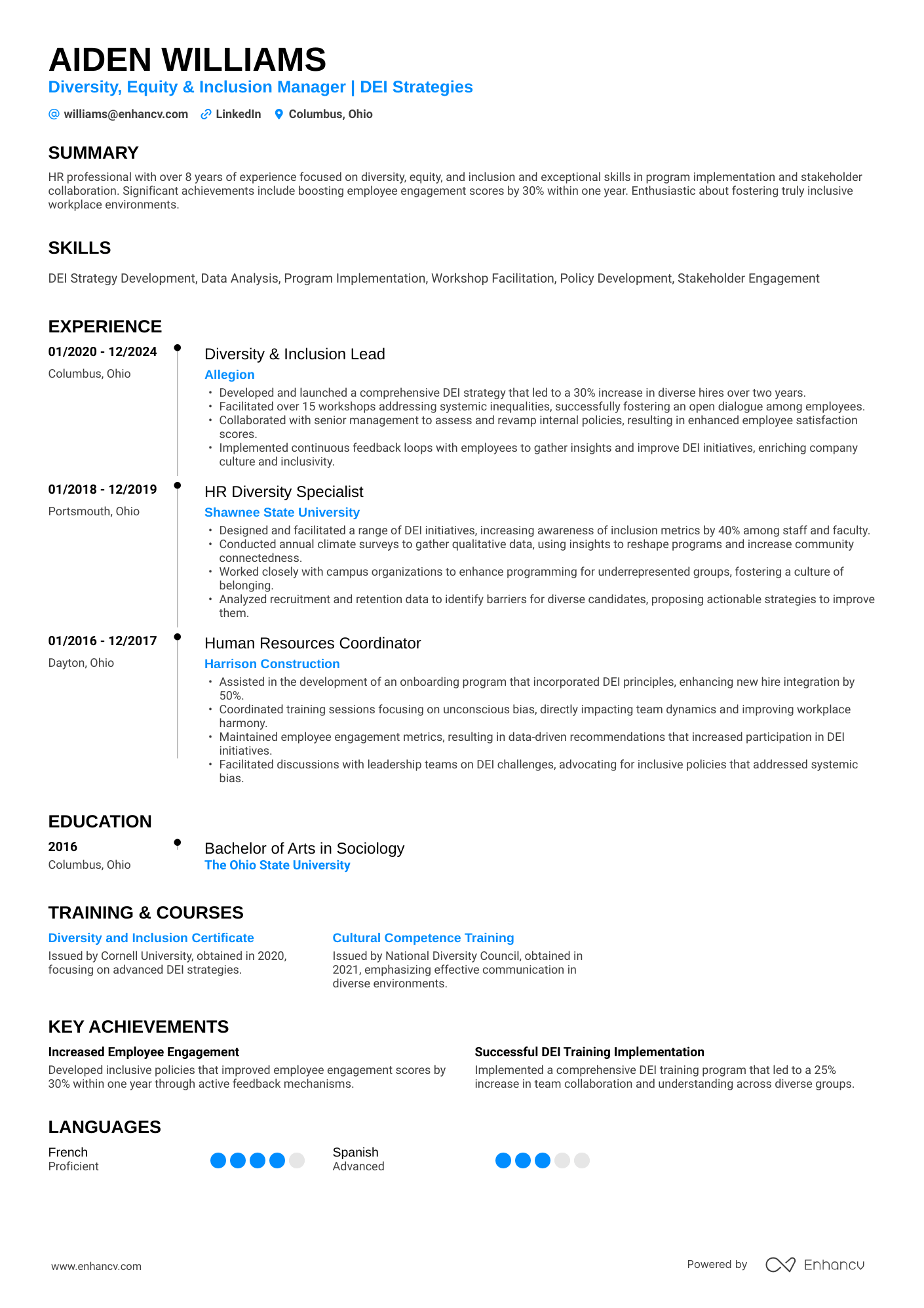Writing an HR resume when you already live in HR can feel oddly high-stakes. You know exactly how fast recruiters skim, how applicant tracking systems (ATS) work, and how generic most resumes look.
Meanwhile, LinkedIn’s Global Talent Trends report shows 92% of hiring professionals rate soft skills as vital as hard skills.
Your challenge is proving those skills on paper, not just listing policies and tools.
This guide will help you shape an HR resume that looks strategic and earns interviews. We’ll break down structure and wording, so you can stop overediting and hit send with confidence.
Key takeaways
- Choose a reverse-chronological or hybrid format that highlights recent HR scope and systems, while keeping your career timeline clean and easy to scan.
- Write experience bullets around decisions and outcomes, not duties, and tailor them to each job ad like a mini HR audit.
- Quantify “people work” with scope, change, volume, survey scores, and risk reduction, so soft skills show up as real, measurable impact.
- Group your skills into people and partnership, HR operations and compliance, and tools and systems, then prove them in the content.
- Use Enhancv’s AI tools for structure and customization but always add your own voice, metrics, and context to keep the resume genuinely yours.
From HR generalist to HR manager and beyond, the following resume examples have you covered. Scroll through the CPRW-approved samples and find the right resume for you.
27 human resources resume examples
By Experience
By Role
If you’d rather build your HR resume from scratch with a bit of expert backup, you’re in the right place.
How to choose the best HR resume format
Usually, you’d use a reverse-chronological format for an HR resume. It mirrors how you already review resumes yourself: clear job titles, dates, and impact at a glance.
Start with your contact details, then summary, experience, skills, and education.
This structure helps employers quickly see your most recent HR scope, industries, and systems.
PRO TIP
A hybrid (combination) format can work if you’ve moved into human resources from another field. Lead with a skills or HR Highlights section, then show your roles in order underneath. It lets you foreground HR projects, even if your titles still look “non-HR.”
A fully functional format is usually risky in your sector. It can hide dates and progression, which is exactly what many HR professionals distrust. Use it only if you have very long gaps and you’re ready to explain them in your cover letter or interview.
Drop your current resume into Enhancv’s Resume Checker. It reviews 19 key areas and shows exactly where your HR resume can improve.
Is your resume good enough?
Drop your resume here or choose a file. PDF & DOCX only. Max 2MB file size.
Once your resume format’s sorted, it’s time to tackle the section hiring teams care about most: your HR experience.
How to write your HR resume experience
On an HR resume, your experience section is more than job titles and dates. It’s where you show how you influence leaders, shape processes, and protect the business.
It’s also the best place to prove soft skills in context. Coaching, conflict resolution, change management, and discretion all land better when tied to real outcomes.
When you write this section:
- Lead with impact, not tasks. Start bullets with what changed, then how you did it. The STAR method is your best bet.
- Use HR metrics you already track. Examples include time-to-fill, quality of hire, regrettable attrition, engagement scores, and case closure times.
- Name the departments you work with. For instance, “partnered with VP Sales” or “advised front-line managers.”
- Mention tools and environments. Consider mentioning Workday, BambooHR, multi-state payroll, unionized sites, or high-volume hourly hiring.
- Choose verbs HR recruiters appreciate. Strong options include partnered, advised, implemented, escalated, streamlined, audited, and coached.
Look at how this works in practice:
Good example of an HR experience section
Senior HR Generalist
Acme Technologies | Austin, TX
2021–2024
- Partnered with leaders across a 220-employee tech organization on hiring, performance, and ER issues, while aligning decisions with company policies and local laws.
- Cut time-to-fill for sales roles from 50 to 30 days by tightening intake and training managers on structured interviews.
- Led onboarding refresh for hybrid employees, improving 90-day retention by 16%.
- Resolved 85% of employee relations cases at an early stage through coaching, documentation, and consistent use of a tiered investigation framework.
How to tailor your HR resume experience
You already know resumes should be tailored. You see the difference every day between a generic application and one that mirrors the job ad.
The problem is that many HR professionals don’t do this for their own resumes. Or they stop at swapping a few keywords in the summary.
Treat tailoring like a mini HR audit:
- Skim the job ad and highlight the top five priorities for the role.
- Mirror that language in the bullet points.
- Pull one or two achievements that prove you’ve handled similar scope or headcount.
- Remove older or less relevant HR work instead of listing every initiative.
PRO TIP
Recently, we spoke to 25 recruiters who all confirmed: time is their scarcest resource.
Yours is, too. Start with one strong master HR resume, then adapt it slightly for each role.
Enhancv’s Job Tailoring Tool can read the job ad, surface the right keywords, and suggest targeted updates to your summary, skills, and bullets.
You stay in control of the content, but you save the mental load of tailoring everything from scratch.
We took a real job posting and used our AI Resume Builder to show you the difference between a vague and a tailored bullet point.
Resume tailoring examples for an HR specialist
| Job description excerpt | Untailored bullet | Tailored bullet |
|---|---|---|
| Assists the HR Director in conducting new employee orientation to foster a positive attitude toward company goals. | Helped HR Director in conducting new employee orientation. | Co-facilitated new hire orientation with the HR Director, lifting 90-day engagement scores by 12%. |
| Maintains HR systems by entering Personnel Actions, Terminations, Promotions, Pay rate changes, and monitoring performance review status. | Entered employee changes into the HRIS and kept track of performance review completion across the team. | Ensured HRIS accuracy by processing 200+ personnel actions a year and tracking review status, keeping data 98% accurate and reviews 95% on time. |
| Maintains the iCIMS database by opening and closing positions once the HR Director has approved the position. | Posted and closed approved requisitions in iCIMS once roles were cleared. | Managed iCIMS requisitions for 60+ roles a year, ensuring approved postings went live and closed correctly, reducing posting errors by 25%. |
Notice the numbers in the tailored bullets? Use similar metrics in your own resume.
Here’s how to work them in naturally.
How to quantify HR experience without forcing it
As an HR professional, you already live in numbers. Headcount, time-to-fill, turnover. The hard part is to bring those into bullets that still feel human.
Here’s how to do it, even for “people work”:
Easy metrics you can use in HR
| What to quantify | Example bullet point |
|---|---|
| Scope | Provided HR support to 150 employees across two locations. |
| Change over time | Reduced voluntary turnover on a 60-person team from 18% to 11% in one year. |
| Frequency or volume | Coached 12 managers on performance conversations each quarter, which cut formal complaints by 30%. |
| Surveys and feedback | Improved onboarding survey scores from 7.1 to 8.5 after redesigning the first week |
| Risk or compliance impact | Closed 40+ ER cases a year with zero substantiated legal claims |
You may worry about quantifying soft skills—often the hardest to prove but most important to back up. Don’t. Focus on the result of that skill instead.
How did your communication, coaching, or diplomacy change a decision, improve a metric, or prevent a problem for the organization? That’s what you write down.
Instead of “strong communicator,” show the outcome of that skill.
For example: “Coached 10 new managers on feedback conversations, cutting formal complaints by 25% in six months.”
Effective bullets like these are easier with Enhancv’s Bullet Point Generator.
It handles sentence structure and suggests strong wording, while you plug in your own results and metrics.
We’ve mentioned skills already. Now, let’s focus on which ones matter most on an HR resume and how to highlight them.
How to turn your HR skills into a clear story
A good HR resume shows how you’ve used your skills to move people, processes, and decisions in the right direction.
Think of your resume as one story told in three main places: summary, experience, and skills. The same themes should show up in all three.
When you write:
- Pick two or three core themes: For example, scalable hiring, employee relations, and HR operations. Make those obvious everywhere.
- Use mini “challenge–action–result” (CAR) moments: “High turnover → coaching and process change → lower attrition.”
- Echo your key skills in context: If you list “manager coaching,” show a bullet where coaching changed outcomes.
- Make your level obvious: Mention who you advise—front-line managers, directors, VP, or C-suite.
Put the practical in the panel, keep the personal in the prose: tools go in skills lists, people skills live in your stories. That way, ATS reads the tools, and humans feel the trust.
To help you decide which skills to include in your resume, we’ve created three clusters you can borrow. A mix of all three works best—just keep the placement rule in mind before you start sprinkling skills across your resume.
The first group focuses on soft skills and shows how you work with managers and employees day to day.
People and partnership skills
- Manager coaching
- Stakeholder management
- Employee advocacy
- Difficult conversations
- Change communication
- Conflict resolution and mediation
- Influencing without authority
Next, pick your key hard skills and weave them strategically into your resume.
HR operations and compliance skills
- Employee relations investigations
- Performance management frameworks
- Policy interpretation and rollout
- Leave administration (FMLA, ADA, where relevant)
- Termination and offboarding process
- Documentation and file audits
- Multi-state or multi-site HR support
The third group is about technical skills on your HR resume. Only list those that match the job requirements.
Tools, data, and systems skills
- HRIS administration (e.g., Workday, BambooHR)
- ATS use and reporting (e.g., iCIMS, Greenhouse)
- HR metrics and dashboards
- Excel for HR reporting (pivot tables, lookups)
- Survey tools and engagement platforms
- Payroll or timekeeping systems
- Basic HR data analysis and insights
Once your skills are in place, the next puzzle piece is showing the formal training that makes your HR profile credible.
How to list your certifications and education on your HR resume
For most HR roles, education is a ticket to entry, not the main reason you get hired. Many job ads still ask for a bachelor’s in HR, business, psychology, or a related field.
If you’re early in your HR career, keep your education section visible and simple:
- Place it above Еxperience if you have less than three years in HR.
- Include degree, major, university, city, and graduation year.
- Add HR-relevant coursework only if you’re light on hands-on experience.
Once you have solid HR experience, education becomes supporting evidence:
- Move it below experience and skills.
- You can drop the graduation year after eight to ten years if you prefer.
- One clean line per degree is enough.
Certifications work differently. They show current HR knowledge and commitment in a way old electives do not.
They matter most when:
- You moved into HR from another field and want extra credibility.
- The role mentions PHR, SPHR, SHRM-CP, SHRM-SCP, or regional equivalents.
- You’re aiming for senior roles where strategy and compliance sit front and center.
For many companies, the degree is the checkbox that gets you past screening. Certifications are the differentiator that helps you stand out and move up.
You can list them like this:
Education & Certifications entry sample
Education
BBA, Human Resource Management
University of Texas at Austin
2023
Certifications
PHR – HRCI, 2024
SHRM-CP – Society for Human Resource Management, 2023
Below are the five top credentials on American HR resumes:
Best certifications for your HR resume
- aPHR–Associate Professional in Human Resources: Great for entry-level HR roles or career changers who want to prove foundational HR knowledge.
- PHR – Professional in Human Resources: A solid choice for early to mid-level HR professionals who handle day-to-day HR operations and employee relations.
- SPHR – Senior Professional in Human Resources: Best suited for senior HR leaders who focus on strategy, policy, and leading HR functions rather than only executing them.
- SHRM-CP – SHRM Certified Professional: Ideal for HR generalists and business partners who balance hands-on work with advising managers and interpreting policy.
- SHRM-SCP – SHRM Senior Certified Professional: Targeted at senior HR leaders who shape HR strategy, influence executives, and oversee complex, multi-site or multi-country environments.
You’ve mapped out your experience, skills, and credentials—now your HR summary has to turn that into a clear story someone can grasp in one quick scan.
How to write a tailored HR resume summary
An HR summary that just repeats your job title and years in the field wastes the most visible part of your resume. Use it to add information recruiters don’t get from the headline.
A strong HR summary should quickly show:
- Your function and level: HR generalist, HRBP, TA manager, HR director.
- Your industry or environment: Tech, healthcare, manufacturing, unionized sites, high-volume hourly.
- Your main themes: Hiring, ER, HR operations, change, rewards.
- One or two proof points: Headcount, scope, metrics, or signature projects.
Naming your function and industry helps ATS and humans match you faster. “HR Generalist in SaaS” or “HRBP for manufacturing plants” narrows the story in a good way.
You’re not writing “hard-working HR professional with X years of experience.” You’re giving a one-glance story of who you support, what you improve, and where you fit next.
This is how this can work in practice:
Example summary
Senior HR Business Partner in healthcare, supporting 450+ clinical and corporate staff across three sites. Expert on employee relations, manager coaching, and change communication. Partnered with leaders to cut regrettable turnover by 14% and reduce ER case resolution time from 28 to 15 days. Known for translating policy into practical steps managers actually follow.
Like every other part of your resume, your HR summary works best when it’s tailored to a specific role. Use the job description as the main input for Enhancv’s AI Resume Builder, then layer in your own voice, examples, and metrics.
AI gives you a strong starting point, but the real impact comes from combining the tool’s structure with your personal achievements and context.
Start tailoring your HR summary
Drop your resume here or choose a file.
PDF & DOCX only. Max 2MB file size.
How do I write an HR resume with no experience?
Plenty of people land their first HR role without “HR” in their job titles.
Common starting points include:
- HR assistant/HR coordinator: Admin tasks, hard to show impact, easy to sound generic.
- Talent acquisition coordinator: Scheduling and support, feels “too light” compared to full-cycle recruiting.
Your goal isn’t to fake experience. It’s to show you’re ready for human resources, even if your current role lives elsewhere.
Format and length
- Use a hybrid format to spotlight transferable skills, while keeping your education and related experience in a clear, linear timeline.
- Keep it to one page unless you have a long prior career.
- A two-column layout works well. Use the main column for summary and experience, and the side column for skills, courses, certifications, and tools.
What to put on an HR resume with no experience
Build your sections with intention:
- Consider writing a short objective statement. State your target role, background, and HR interests.
Example objective
Customer service professional seeking an entry-level HR role, leveraging experience coaching peers, resolving sensitive issues, and consistently maintaining 95%+ customer satisfaction across 500+ monthly interactions.
- In your experience section, use your current role, but frame “hidden HR” tasks, such as:
- Training new hires or buddies
- Handling complaints and de-escalating situations
- Scheduling, tracking time, or managing basic data in systems
- Working with confidential or sensitive information
- Mention relevant HR projects like class projects, capstones, or internal initiatives.
- Prioritize education and relevant coursework, especially if you’re early career.
- Highlight credentials like aPHR, LinkedIn Learning HR courses, or local HR programs. They can boost your employability and your resume’s impact.
- Use the job ad as a guide for your skills list, but only include strengths you genuinely have. Choose five to ten and back each one up with a concrete change or result.
Finally, refine the wording yourself, so it still sounds like you. Relying too heavily on AI to write your resume can backfire.
Here’s what a recruiter recently shared:
I use ChatGPT all the time, so I can see it. I love ChatGPT—not hating on you for using it—but give it that human eye. Give it that once-over. Make sure what you're putting is accurate.
Kassandra Valle, talent acquisition manager in renewable energy
Frequently asked questions about HR resumes and job applications
If you want to dive deeper into what makes an HR resume (and application) work, you’re not alone.
Here are answers to some of the most common questions HR professionals ask when they’re on the candidate side of the table.
What should your HR resume header include?
Your header should make it easy to contact you and understand what you do.
Include:
- Full name
- City and state (or “Remote”)
- Phone number
- Professional email
- LinkedIn profile
- Optional: portfolio or personal site if you write, speak, or publish on HR topics
You can also add a short professional title, like “HR Generalist,” “HR Business Partner,” or “Talent Acquisition Manager.” That helps align you with the role before anyone reads further.
What’s the best resume design for HR professionals?
You don’t need a super creative design. You need something clean, structured, and easy to skim.
Prioritize:
- Clear section headings
- Enough white space
- Consistent bullet style
- One or two columns max
Avoid heavy graphics or text boxes that might confuse basic ATS systems. A modern layout with a sidebar is fine as long as text remains selectable and simple.
How should you save and name your HR resume?
Save your resume as PDF unless the job ad explicitly asks for Word. That way, your layout and spacing stay intact.
For the file name, keep it clear and professional:
“First-Last-HR-Generalist-Resume.pdf”
This helps recruiters find you quickly in their folders. It also looks much better than:
“CVfinalnew_NEW2.pdf”
What are good additional sections for an HR resume?
Beyond the standard sections, HR resumes can benefit from:
- Projects or initiatives: Brief bullets on things like onboarding redesign, policy updates, or engagement projects.
- Professional memberships: SHRM, local HR associations, or similar.
- Speaking, writing, or training: Internal workshops you’ve led, panels you’ve joined, or articles you’ve written.
Pick what genuinely adds to your story, not everything you have ever done.
Do I need industry-specific experience to get an HR job?
Industry-specific HR experience helps, but it’s not always mandatory. Many skills transfer well across sectors: employee relations, performance management, hiring, and coaching managers.
Industry experience matters more when:
- There are heavy regulations or unions.
- You’re applying for senior HR roles.
- The business model is very specialized, like hospitals or manufacturing plants.
If you’re changing industries, show:
- Similar workforce types (hourly, shift-based, clinical, sales).
- Any experience with relevant laws, safety, or compliance.
- Your ability to learn a new environment quickly.
What should I include in a human resources cover letter?
Treat your cover letter as a short, focused story.
Include:
- A clear opening that names the role and why you’re interested.
- One or two examples that show how you’ve supported people and leaders.
- Any HR metrics or outcomes that connect to the job ad.
- A closing line that invites next steps.
Avoid repeating your resume. Use the letter to explain fit, motivation, and context that don’t fit in bullets.
Drop your resume here or choose a file.
PDF & DOCX only. Max 2MB file size.
How do I describe AI skills in an HR role?
You don’t need to label yourself an “AI expert” to show you work with AI. Focus on how you use it.
You can:
- Mention AI tools in your skills or tools section (e.g., AI-assisted sourcing, AI resume screening tools, chatbots).
- Add bullets like:
- “Used AI tools to screen high-volume applications, reducing manual review time by 30% while keeping quality of hire stable.”
- “Tested and documented AI-assisted sourcing workflows, flagging bias risks and aligning usage with company policies.”
Show that you understand both the benefits and the risks, especially around fairness and privacy.
What’s the most competitive HR role in the United States?
According to Robert Half’s 2025 report, the most wanted HR roles include HR manager, HR coordinator, HR generalist, and recruiter.
These sit in the top 25% of HR roles in demand, which also makes them some of the most competitive.
Assume strong competition for any of these titles, especially at well-known companies or in fully remote roles. To stand out, lean on tailored experience, clear scope, and metrics that show how you helped leaders, teams, and hiring outcomes—not just what your title was.
What industry has the highest demand for HR specialists?
An analysis of DigitalDefynd’s top HR career cities shows a clear trend.
In the US, technology, healthcare, manufacturing, education, government, transportation, and energy are among the industries with the strongest demand for HR specialists.
Final thoughts
Writing an HR resume can feel strange when you’re used to being on the other side of the table. You know how quickly hiring teams scan and how generic many applications look.
The way through is to treat your resume like any good HR project. Define what success looks like, gather the right data, and tell a clear story.
Use format, experience, skills, and credentials to show how you support people and leaders, not just where you have worked. Then let tools like Enhancv handle the structure, while you bring the insight only you have.
